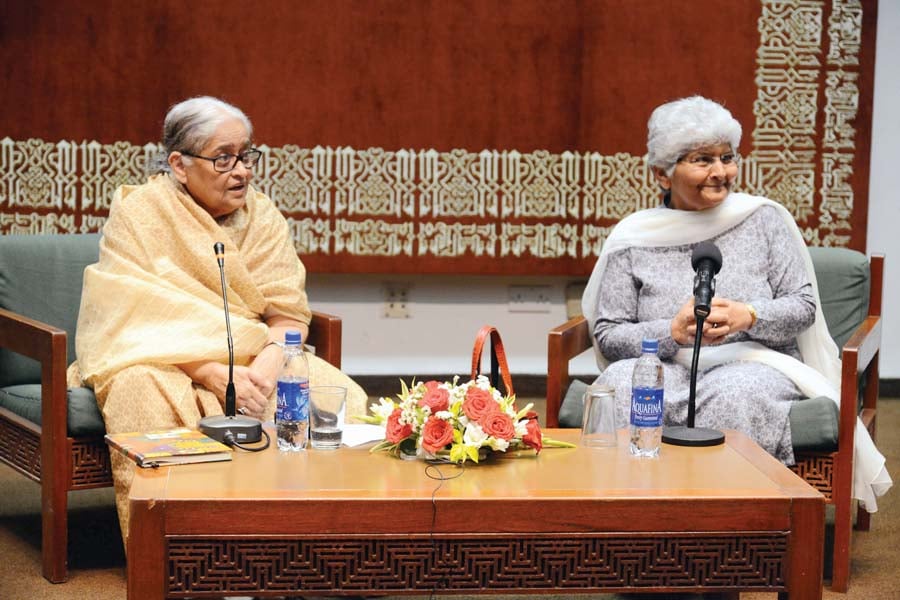
Only a few individuals have the gift of engaging people through dialogue, and (to paraphrase the words of T S Eliot) even fewer possess the ability to communicate the essence of their words before they are even understood.
The latter is the impact that Urdu writer Arfa Sayeda Zehra and poet Zehra Nigah’s dialogue at the Sixth Sense Forum, Aga Khan University Hospital (AKUH) on Thursday evening had on the attendees.
The writing veterans were supposed to discuss the topic, ‘Poetry: reflective of today and yesterday’s image’, but their talk mainly focused on a multitude of other things, including the need for people to open up their minds and be less ritualistic in today’s world. It also comprised an occassional interchange of shairs (verses) between Arfa and Zehra.
Arfa began her talk with a quip that she considers late Ziaul Haq as “her beloved.” Explaining this in crisp Urdu, she said, “Bilkul mehboob ki tarha thay. Woh General sahab thay; kehte kuch thay aur karte kuch thay. Lagtay apne se thay, magar hote doosron ke thay!” (He was just like one’s beloved. He was a General; he would say one thing and do another. He seemed to be our own, but belonged to others!)
She wondered why he maintained an iron-fisted rule for 11 years when he promised to stay in power for only 90 days. She added that had it not been for a certain state actor, he would never have been removed.
Arfa recalled the time when she was invited to a conference once and General Zia began his speech saying, “I greatly dislike writers and teachers.”
She said to him, “My teachers have taught me that God is a writer and his Prophets, teachers.” Her power-packed words were followed by a huge round of applause then and even this time. She shared that the General walked away after what she said.
As the discussion progressed, Zehra said, “Good poetry comes out in the form of a ghazal and it is this ghazal in the backdrop of history that tells a tale of the [arduous] time poets have lived in.”
While talking a little about the works of Mirza Ghalib, Allama Muhamamd Iqbal and Altaf Hussain Hali, the ladies shared that not only do their writings intellectually stimulate one’s thinking, but also catalyse emotions. “Had poets of such calibre not been born, the entire subcontinent would have been numb to the atrocities that took place during their time.”
Later, Arfa said that had Ghalib lived in these times, he would have been termed an outlaw and a blasphemous person for having referred to God as ‘Uss’ and ‘Jiss’ in his poetry.
Zehra advised the audience that poetry offers the best respite from the increasing worldly troubles that we find ourselves surrounded by. Read Urdu poetry as much as possible as “it’s almost like a flowing river in your head. It will help you to become indifferent to problems of the world.”
Published in The Express Tribune, April 5th, 2014.
Like Life & Style on Facebook, follow @ETLifeandStyle on Twitter for the latest in fashion, gossip and entertainment.
COMMENTS (2)
Comments are moderated and generally will be posted if they are on-topic and not abusive.
For more information, please see our Comments FAQ



1732256278-0/ellen-(1)1732256278-0-165x106.webp)
1725877703-0/Tribune-Pic-(5)1725877703-0-165x106.webp)
1726722687-0/Express-Tribune-Web-(9)1726722687-0-270x192.webp)











It must have been a delight to listen these ladies. If video of the talk is available, please share.
“My teachers have taught me that God is a writer and his Prophets, teachers.” Amazing. Brilliant teacher. I feel really lucky that I was her student.